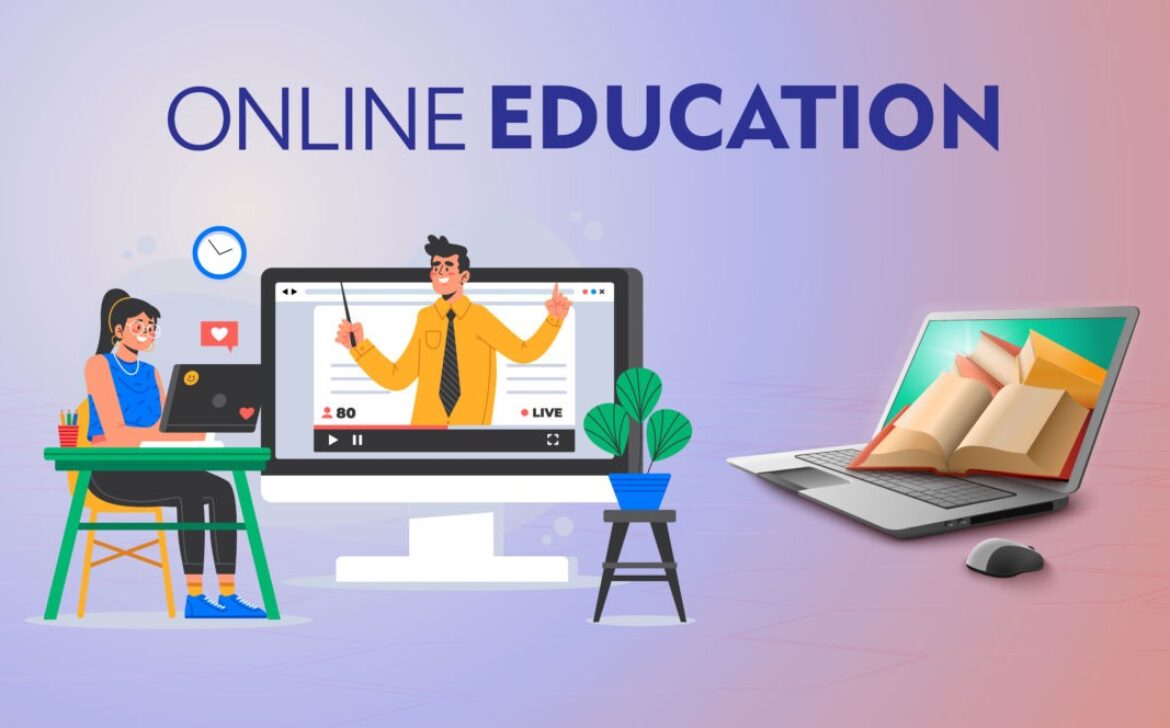Online Education: How it works & It’s importance in 2023
Online education refers to the process of delivering educational content, courses, and programs through digital platforms and the internet. It involves using technology to provide learners with access to educational resources, interactive learning experiences, and opportunities for collaboration and assessment. 1. Course Delivery: Online courses are typically delivered through learning management systems (LMS) or online platforms. Course materials, such as lectures, readings, videos, and assignments, are uploaded to the platform for learners to access. 2. Communication and Interaction: Online education fosters communication and interaction between learners and instructors through various digital tools. These may include discussion forums, chat rooms, email, video conferencing, or live virtual classrooms. 3. Assessment and Feedback: Online assessments are often conducted through quizzes, exams, or assignments submitted electronically. Instructors provide feedback and grades digitally, allowing learners to track their progress and receive timely evaluations. 4. Multimedia and Interactive Elements: Online education utilizes multimedia elements, such as videos, interactive simulations, animations, and virtual reality, to enhance the learning experience. These elements engage learners, facilitate understanding, and make complex concepts more accessible. 5. Self-Paced Learning: Many online courses offer self-paced learning options, allowing learners to progress through the material at their own speed. This flexibility accommodates individual learning preferences and schedules. 1. Accessible Learning: Online education breaks down barriers to education by providing access to individuals who may face challenges with traditional forms of learning, such as geographical limitations, physical disabilities, or time constraints. It enables lifelong learning and education for diverse populations. 2. Flexibility and Convenience: Online education offers flexibility in terms of when and where learning takes place. Learners can study at their own pace, balancing their education with work, family, or other commitments. It allows individuals to tailor their learning to their personal needs and preferences. 3. Diverse Course Selection: Online education provides a vast array of courses and programs covering various disciplines and skill levels. Learners have the opportunity to explore niche subjects, gain new skills, or pursue advanced degrees from reputed institutions worldwide. 4. Enhanced Learning Experience: Online education leverages technology to create interactive and engaging learning experiences. Multimedia elements, interactive exercises, and collaborative tools promote active learning, knowledge retention, and critical thinking skills. 5. Cost-Effectiveness: Online education can be more cost-effective than traditional on-campus learning. Learners can save on commuting, accommodation, and material expenses. Additionally, online courses often have lower tuition fees, and free or affordable options are available, making education more accessible. – Anant Agarwal
1. Flexibility: Online education offers the flexibility to learn at your own pace and convenience. Learners can access course materials and lectures anytime, anywhere, allowing them to balance their studies with other commitments such as work or family responsibilities. 2. Accessibility: Online education breaks down geographical barriers, enabling individuals from different locations to access high-quality education. It provides opportunities for those who may not have access to traditional educational institutions due to distance, disabilities, or other limitations. 3. Diverse Course Selection: Online education offers a wide range of courses and programs to choose from. Learners have the flexibility to select courses that align with their interests, career goals, or specific skill development needs. They can explore niche topics or access courses from renowned institutions worldwide. 4. Cost-Effectiveness: Online education can be more cost-effective compared to traditional on-campus programs. Learners can save money on commuting, accommodation, and related expenses. Additi onally, online courses often have lower tuition fees or provide free or affordable options, making education more accessible to a broader audience. 5. Self-Paced Learning: Online courses often allow learners to progress at their own pace. This flexibility accommodates different learning styles and preferences, ensuring that individuals can spend more time on challenging topics or move quickly through familiar content. 1. Lack of Face-to-Face Interaction: Online education typically lacks face-to-face interaction with instructors and fellow students. This absence of in-person interaction may make it challenging for some learners to engage, seek clarification, or develop a sense of community and collaboration. 2. Self-Motivation and Discipline: Online learning requires self-motivation and discipline. Without a physical classroom and regular schedule, learners need to be proactive in managing their time, staying organized, and keeping up with coursework. It can be challenging for those who struggle with self-directed learning or require external structure and accountability. 3. Limited Networking Opportunities: Building networks and connections can be more challenging in an online learning environment compared to traditional education. Social interaction may be limited to virtual forums and discussion boards, which may not provide the same level of networking opportunities as face-to-face interactions on a campus. 4. Technology Dependence: Online education relies heavily on technology infrastructure, including stable internet connections and access to devices like computers or smartphones. Technical issues, connectivity problems, or lack of access to suitable technology can hinder the learning experience for some individuals. 5. Limited Hands-on or Practical Experience: Some fields of study, such as sciences, healthcare, or performing arts, require hands-on or practical training that may be difficult to replicate fully in an online setting. Certain skills and competencies may be best acquired through in-person instruction and physical practice. Online education continues to evolve and adapt, with advancements in technology allowing for more immersive and interactive learning experiences. It has become an integral part of the education landscape, offering flexibility, accessibility, and opportunities for lifelong learning. I am text block. Click edit button to change this text. Lorem ipsum dolor sit amet, consectetur adipiscing elit. Ut elit tellus, luctus nec ullamcorper mattis, pulvinar dapibus leo.How Online Education Works:
Importance of Online Education:
Online education is like a rising tide, it’s going to lift all boats.
Advantages of Online Education:
Disadvantages of Online Education:

Conclusion :

